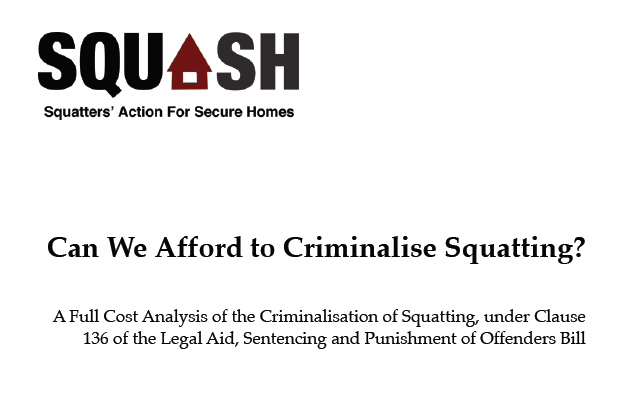Search SQUASH Website
See all pages in the sitemap »
SQUASH Publications
“Homes, Not Jails” (April 2015)

- There have been at least 588 arrests, 200 prosecutions and 51 convictions under s144 LASPOA, with 75% of those arrests occurring in London.
- Case studies and statistics show that the police use s144 LASPOA in an arbitrary manner to summarily evict people suspected of squatting, without sufficient evidence.
- Those prosecuted have been men and women, aged between 21 and 41, the exact demographic that is bearing the brunt of Britain’s housing crisis
- Most evictions and arrests under s144 LASPOA occurred during the Winter months (October – March), endangering the lives and well-being of those thrown out into the cold.
- Calls by politicians and mainstream media, to extend the criminalisation of squatting to commercial buildings, threatens to create housing instability for many more young people.
-
“Homes, Not Jails” SQUASH blog post – summary & links
- “Homes, Not Jails” report (346KB)
- “Appendix: Evidence Base for Homes, Not Jails” (1,927KB)
- “Homes, Not Jails: Policy Brief Summary” – 6 pages
- “Appendix: Evidence Review of Homes, Not Jails” – 55 pages
“The Case Against Section 144″ (March 2013)

- “The Case Against section 144” SQUASH blog post – summary & links
- “The Case Against section 144” launch in Parliament – with commentary on the report from Crisis, Simon Community, Tuckers Solicitors and housing barrister, David Watkinson
- “The Case Against section 144” (SQUASH, 2013)– 25 pages, 890kb
“Can We Afford To Criminalise Squatting?” (2012)

- “Can We Afford to Criminalise Squatting?” (SQUASH, 2012)– 29 pages, 400kb
“Criminalising the Vulnerable: Why we can’t criminalise our way out of a housing crisis” (May 2011)
SQUASH parliamentary briefing. An outline of the problems surrounding the proposed criminalisation of squatting. This was presented in Parliament at the public launch of the Squash campaign 18 May 2011. Download PDF 1.9mb »SQUASH Policy Briefings
SQUASH Factsheets and FAQ
SQUASH Frequently Asked Questions Download PDF 86kb »
SQUASH 1994 Reports
“Ordered Out: Public Order and Housing Chaos” (1994)
A briefing on the effects of The Criminal Justice and Public Order Bill on the rights of squatters, tenants and the homeless. Published in 1994. Download PDF 7.1mb »“A Crime to be Homeless” (1994)
Squash publication from 1994. A briefing on the criminalisation of squatting. Download pdf 2.2mb »
Government publications
Ministry of Justice Response to 2011 Squatting Consultation Paper
Other research
Squatting: a homelessness issue – An evidence review by Crisis, October 2011
The Hidden Truth About Homelessness – Crisis report, May 2011
Liberal Democrat Action for Land Taxation and Economic Reform Squatting Consultation Response
“The Conservative Justice Minister Crispin Blunt has launched a consultation which proposes that squatting in all properties should be criminalized.
“Surely this is in our best interests? ALTER says not, and has explained why in its answer to the consultation. This change is contrary to the interests of UK taxpayers. It would provide a valuable state funded benefit to wealthy tax avoiders.” [On Scribd]
Empty Properties Survey – The University of Nottingham Survey Unit and East Midlands Empty Property Forum, May 2008
Empty Homes Agency Database – “737,491 empty homes are currently empty in England according to the 2011 Empty Homes Stats! The latest empty homes statistics show that of these, 300,000 are long-term empty (meaning they have been empty for more than six months).”
Squatting: The Real Story (Chapters 1 – 7) – Book about Squatting history
Colin Ward’s The hidden history of Housing – Explores “aspects of the history of housing, in terms of housing based on local and popular initiative, self-help and mutual aid.”
In the media
Media and politicians are misleading about law on squatters The Observer, September 2011
“We are legal academics, solicitors and barristers who practise in housing law acting for landlords, tenants, owners and occupiers. We are concerned that a significant number of recent media reports have stated that squatters who refuse to leave someone’s home are not committing a criminal offence and that a change in the law – such as that proposed by the government – is needed to rectify this situation.
“This is legally incorrect, as the guidance published by the Department for Communities and Local Government in March this year makes clear. We are concerned that such repeated inaccurate reporting of this issue has created fear for homeowners, confusion for the police and ill informed debate among both the public and politicians on reforming the law.”
Hackney GP backs squatters fighting eviction from abandoned school Hackney Gazette, July 2011
“When our neighbours started squatting last month, they introduced themselves to us and invited us around to see what they were doing with the building and grounds.
“We were delighted to see that they are taking care of where they are living and considerate of us, their next-door neighbours. For the first time since we have been living here, we have the security of neighbours we can trust.
“I believe that to evict them and use council money to pay security guards to man the gates while the building rots would be criminal, if not in the legal sense, then most certainly morally.” ‘Squatting is the perfect example of the Big Society’ The Independent, May 2011
“Squatters tend to occupy long-term empties often owned by absentee property speculators registered in offshore tax havens. To criminalise squatting would protect only one set of people: the greedy and the powerful who can afford to keep property empty.”
Squatting related sites
Squat or Rot – Blog documenting numerous squats, past and present. The great improvements made to buildings and communities by the squatters and their projects is more than evident.
